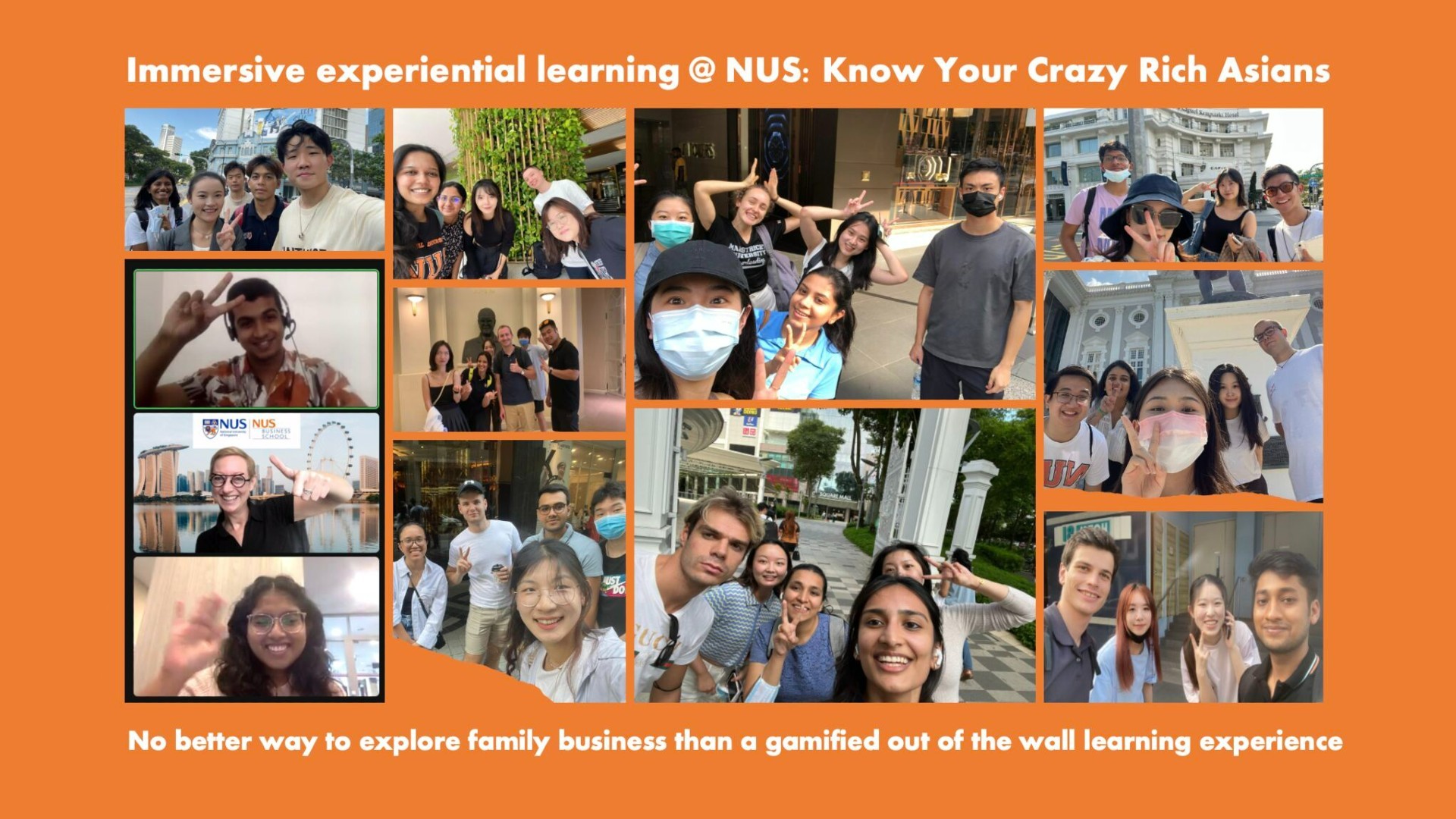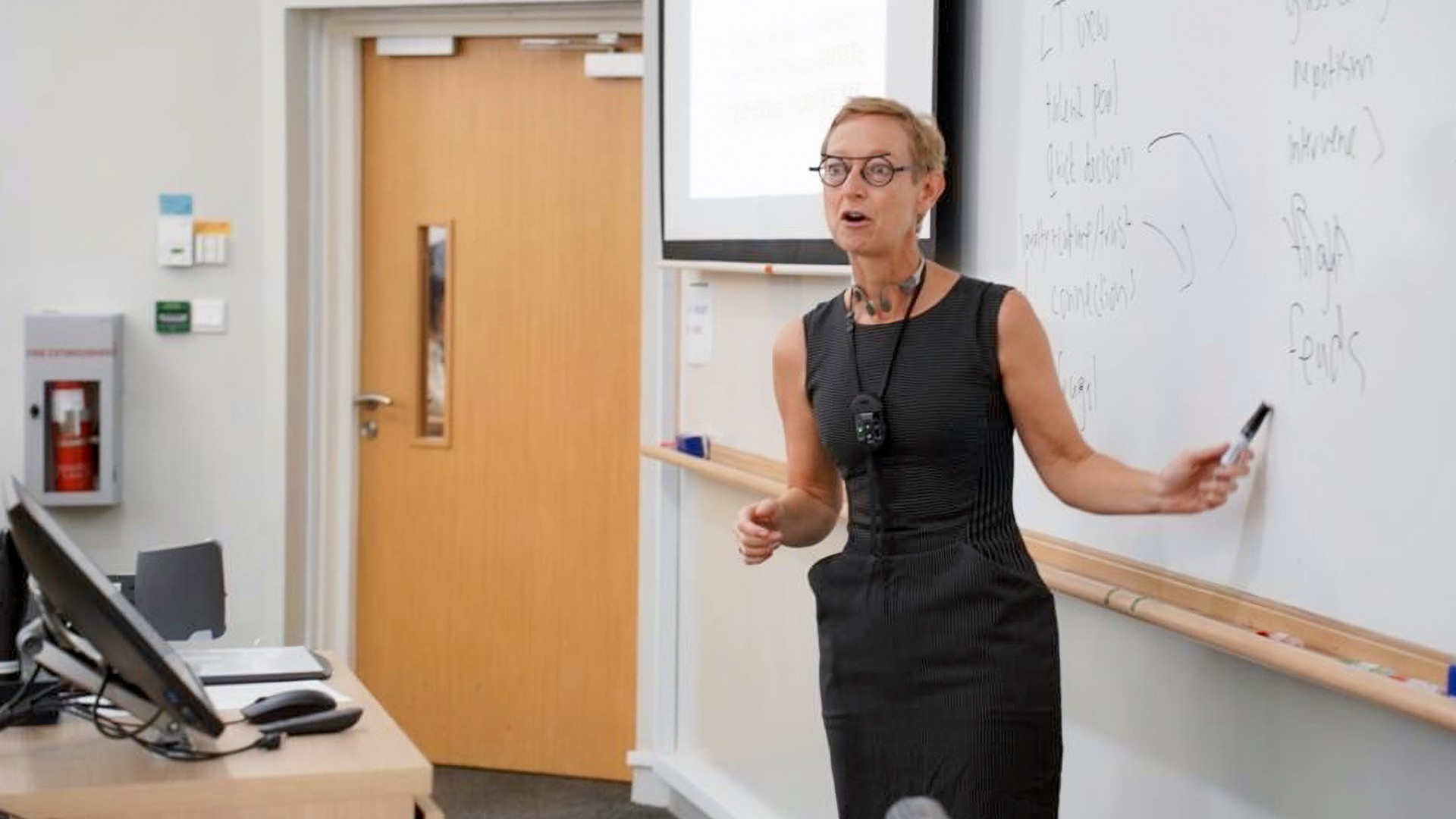On the trail of Singapore’s Crazy Rich Asians: Discovering family-run businesses with a gamified twist
 In this series, NUS News highlights the University’s innovative teaching strategies, spotlighting the educators breathing life into the lessons in unique and innovative ways.
In this series, NUS News highlights the University’s innovative teaching strategies, spotlighting the educators breathing life into the lessons in unique and innovative ways.
Those who frequent downtown Singapore would be familiar with these three iconic buildings: UOB Plaza, Republic Plaza and Parkview Square. One thing they have in common, besides their monolithic presence, is that they are owned by family firms: UOB Bank (the Wees), City Developments Limited (the Kweks) and Chyau Fwu Development (the Hwangs) respectively.
Family-run firms are more common in Singapore than one might expect. In fact, they make up about 60 per cent of companies listed on the Singapore Exchange (SGX).
This is something that recently dawned on NUS Business students as they traipsed through Raffles Place, Little India and Bugis during a scavenger hunt orchestrated by their professor. The idea was simple: arrive at a landmark associated with a family firm, watch a mini-video lecture, then solve a riddle or puzzle to get to the next building.
Titled “Know Your Crazy Rich Asians”, the street game is open to Bachelor’s, Master’s and Master of Business Administration (MBA) students who sign up for Associate Professor Marleen Dieleman’s popular Family Business course.
“They will never look at Raffles Place in the same way,” said Assoc Prof Dieleman, who teaches at NUS Business School's Department of Strategy & Policy. “They will realise that many of the buildings in Raffles Place are in fact family business buildings, and sense the important role business families played in the economic success that Singapore is today.
“I can tell them this with some statistics, but that’s not the same as discovering it on the spot when you are there.”
Going on tycoon trails
The idea for the game, which is part-scavenger hunt, part-heritage trail, came about during the COVID-19 gloom, when students were not allowed to gather in class but could meet outdoors in groups of five. Assoc Prof Dieleman jokes that it took her “a million hours” to design.
“I didn’t really have a budget, so everything was done on free platforms. The videos were shot by me using Zoom, and then we used WhatsApp groups and YouTube channels to communicate the videos to the people in the game.”
The prizes, in keeping with the theme, were sourced from long-lasting family firms: a meal at Islamic Restaurant in Kampong Glam, or traditional Chinese medicine products from Eu Yan Sang.
One challenge Assoc Prof Dieleman faced was ensuring her students were not too preoccupied with winning.
“Because they want to win, they forget to learn. After the first few rounds, I realised they didn’t retain the insights I intended to convey. Now, before and after the game, I have recaps – I ask them to talk about the lessons (they learnt) from each venue,” added the savvy professor, who has since co-founded a company, Tycoon Trails, that offers a version of the game to corporate clients.
Assoc Prof Dieleman’s course, which focuses largely on Asian firms, helps students understand issues from the viewpoints of owners, employees, investors as well as policymakers.
They go on excursions to places such as homegrown wine company Hock Tong Bee, and listen to illustrious guest speakers like Mr Lim Hock Chee, the chief executive of supermarket retailer Sheng Siong; Mr Richard Eu, chairman of traditional Chinese medicine company Eu Yan Sang International; and Ms Michelle Cheo, chief executive of edible oils and fats business Mewah Group.
Lessons to remember
Assoc Prof Dieleman’s innovative teaching approach has earned her many accolades over the years, including the Outstanding Educator Award, NUS Business School Outstanding Educator Award and NUS Annual Teaching Excellence Award.
“Students learn in different ways,” she added. “They can listen, they can read. But to feel it, to stand in that context, that has a real added value.”
Assoc Prof Dieleman, who has served as a consultant to family firms in Asia, was also an independent director at bulk shipping firm Mercator Lines (Singapore) from 2014 to 2016. She has a PhD from Leiden University in the Netherlands, a Master of Business Science from the Rotterdam School of Management, and first joined NUS as a visiting fellow in 2007. She also recently co-published The Gruyter Handbook of Business Families, which explores emerging research themes and interdisciplinary insights relevant to business families.
Prioritising family values
Through the street game, site visits and stories, students gain valuable insights. One of these is that family firms that emphasise their unique values can excel as compared to their competitors.
The Art Deco-inspired Parkview Square in Bugis, owned by the Taiwanese Hwang family, is a notable example of this.
“It’s full of art and the architecture is stunning. It’s clearly not built to optimise the value of the square metres. It’s done with love, and the building aims to project the beauty of the architecture,” she said. “Families are not only in business for the financial gains – there are also socio-emotional goals, such as reputation.”
As for Sheng Siong’s Mr Lim, “his values are really what makes the difference,” Assoc Prof Dieleman noted. “Everything according to him starts with ren (‘human’ in Chinese), and is about how you relate to other human beings and how you improve yourself. This philosophy is reflected in the way the company is managed. As a result of its unique culture, Sheng Siong has outranked its competitors in terms of profitability.”
The course also explores the various challenges faced by family firms, which could include matters of corporate governance.
“In family firms, the owners identify with the firm, and that sometimes blurs the boundary between what belongs to the company and what belongs to the family business owners. There have been cases where the owners were accused of using company property as if it was their own.”
Former student Mr Kanishk Killa (MSc in Management, 2022) describes Assoc Prof Dieleman’s teaching style as an “eye-opening” mix of fun and learning.
“She has a lot of industry contacts, which give us inside information on what goes on in a family business, and how to tackle business issues,” said Mr Killa, who is now working for his family’s steel and iron manufacturing firm in India.
Ms Azreen Suffiyah Binti Johari, a fourth-year Bachelor of Business Administration student, said the street game was a highlight of her school year. “I’m a ‘story’ kind of person, and the amazing race was basically (about) living in stories and finding out stories in a very physical way.”
She is also a fan of Assoc Prof Dieleman’s teaching style in the classroom. “She made me feel like I had my own voice. She would say, ‘If you were that person, what would you do?’ It put me in the shoes of the people she was talking about.”
The family business course is important as anyone with a business career will inevitably deal with family firms.
“Either they become your employers, or, if you are in a bank or the consultancy industry, they might be your clients. If you are in production of goods, they might be your suppliers or distributors,” said Assoc Prof Dieleman.







